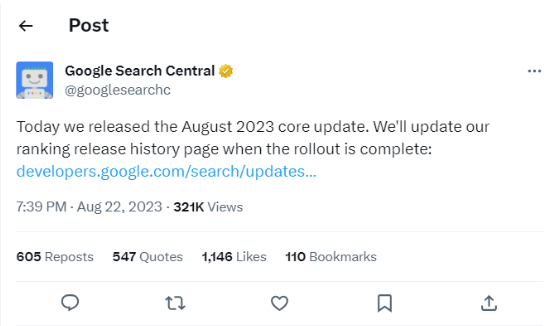On August 22, Google announced the roll out its latest Core Update, bringing in significant changes to search rankings and website visibility. While most of us in the tech world understands what this means, it can sometimes be confusing for business owners to understand the implications. So today we will dive into the details of this update, explain how to interpret the new changes, discuss the implications for your website, provide strategies to recover if your rankings drop.

Understanding Google’s August 2023 Core Update
Google regularly updates its search algorithm to enhance user experience and provide more relevant search results. The August 2023 Core Update aimed to refine these algorithms further and improve the quality of search results. While Google is known for keeping specific details about its updates under wraps, there are several key areas that have been affected by this update:
- Page Experience: User experience has always been a priority for Google. With this update, factors such as website loading speed, mobile-friendliness, visual stability, and safe browsing have gained even more prominence. Websites that prioritize user experience are likely to witness improved rankings.
- Content Quality: High-quality content has always been a crucial ranking factor. However, the August 2023 Core Update fine-tunes this aspect further by emphasizing content relevance and expertise. Websites that offer comprehensive information supported by authoritative sources are expected to rank higher.
- User Intent: Google aims to understand user intent better in order to deliver more relevant search results. The update focuses on aligning search queries with content that fulfills users’ needs effectively.
Interpreting the Changes
While deciphering every intricate detail of the update may be challenging due to Google’s elusive nature regarding algorithm specifics, website owners can make informed interpretations based on industry observations and analysis. Here are a few points to consider:
- Analyze Traffic Patterns: Monitor your website’s traffic patterns before and after the update. Identify any substantial changes in rankings, organic traffic, or user behavior on your site.
- Conduct Keyword Analysis: Evaluate how the update has impacted your targeted keywords. Observe any fluctuations in rankings and assess whether your content is still relevant to user queries.
- Assess User Experience Metrics: Analyze metrics such as bounce rate, time on page, and conversion rates to gauge the impact of the update on user experience. Any significant shifts may indicate areas that need improvement.
Implications for Your Website
- Increased Competition: As Google refines its algorithms, competition among websites vying for top positions intensifies. If your website fails to meet the new standards set by the update, it may lose visibility to competitors who have adapted better.
- Ranking Fluctuations: The update can cause fluctuations in search rankings as Google reassesses websites based on new ranking factors. Some sites may witness a boost in rankings while others may experience a drop.
- User Experience Prioritization: Websites that prioritize user experience will be rewarded with improved visibility and higher rankings, while those neglecting it will face challenges in maintaining their search presence.
Recovering from Ranking Drops
If you find that your website’s rankings have dropped, there are steps you can take to recover:
- Audit Your Website: Conduct an in-depth audit of your website to identify any issues related to page speed, mobile-friendliness, content quality, or technical SEO aspects like broken links or duplicate content.
- Optimize User Experience: Focus on improving user experience by optimizing page load times, ensuring mobile responsiveness, enhancing site navigation, and addressing any issues that may negatively impact user engagement.
- Revise Content Strategy: Review your content strategy and ensure that your content aligns with the new standards set by the update. Create comprehensive, well-researched, and authoritative content that addresses user queries effectively.
- Build Quality Backlinks: High-quality backlinks remain a vital aspect of SEO. Focus on acquiring relevant and authoritative backlinks to boost your website’s credibility and improve rankings.
How OCTG Can Help
At One Click, we understand the challenges businesses face in adapting to Google’s algorithm updates. Our team of experts can assist you in navigating through these changes. Here’s how we can help:
- Website Audit: Our comprehensive website audit will identify areas of improvement based on the August 2023 Core Update’s requirements.
- User Experience Enhancement: We optimize websites for speed, mobile-friendliness, visual stability, and safe browsing to ensure a seamless user experience.
- Content Strategy Refinement: Our team will help you craft relevant and authoritative content that aligns with user intent while incorporating SEO best practices.
- Technical SEO Optimization: We address technical aspects such as broken links, duplicate content, schema markup implementation, and more to improve overall website performance.
If you find yourself struggling with ranking drops or need expert assistance in optimizing your website for the latest updates, One Click is here to help you stay ahead of the curve. Get in touch with us today to schedule a consultation and let us guide you toward digital success.



